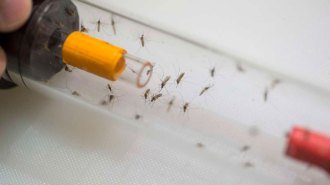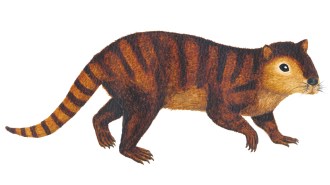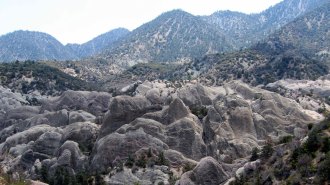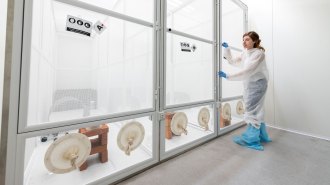Uncategorized
-
 Science & Society
Science & SocietyHow having health care workers handle nonviolent police calls may impact crime
A new study analyzes a Denver program that sends a mental health professional and EMT to handle trespassing and other minor crime offenses.
By Sujata Gupta -
 Chemistry
ChemistryA pigment’s shift in chemistry robbed a painted yellow rose of its brilliance
The degradation of an arsenic-based paint stripped shadows and light from a still life flower in a 17th century work by painter Abraham Mignon.
-
 Animals
AnimalsMosquitoes prefer dozing over dining when they are sleep-deprived
Mosquitoes repeatedly shaken to prevent slumber lag behind well-rested ones when offered a researcher’s leg to feed on, new experiments show.
By Anna Gibbs -
 Paleontology
PaleontologyHow mammals took over the world
In the book The Rise and Reign of the Mammals, paleontologist Steve Brusatte tracks the evolutionary innovations that made mammals so successful.
-
 Earth
EarthAncient zircons offer insights into earthquakes of the past
Analyzing zircons’ chemical makeup can help expose intense quakes from the past and improve our understanding of the physics of today’s tremors.
By Nikk Ogasa -
 Anthropology
AnthropologyA new origin story for domesticated chickens starts in rice fields 3,500 years ago
Chickens, popular on today’s menus, got their start in Southeast Asia surprisingly recently, probably as exotic or revered animals, researchers say.
By Bruce Bower -
 Science & Society
Science & SocietyGrowing wildfire threats loom over the birthplace of the atomic bomb
Climate change is expected to make wildfires worse across much of the Southwest United States. A key nuclear weapons lab could be in the hot zone.
-
 Astronomy
AstronomyA newfound, oddly slow pulsar shouldn’t emit radio waves — yet it does
The highly magnetic neutron star rotates three times slower than the previous record holder, challenging the theorical understanding of these objects.
By Liz Kruesi -
 Space
Space50 years ago, the United States and Soviet Union joined forces for science
In 1972, U.S. and Soviet leaders agreed to work together on science. Now, Russia’s war in Ukraine is straining that decades-long partnership.
-
 Ecosystems
EcosystemsJust 3 ingredients can quickly destroy widely used PFAS ‘forever chemicals’
Ultraviolet light, sulfite and iodide break down enduring PFAS molecules faster and more thoroughly than other UV-based methods.
By Nikk Ogasa -
 Genetics
GeneticsWho decides whether to use gene drives against malaria-carrying mosquitoes?
As CRISPR-based gene drives to eliminate malaria-carrying mosquitoes pass new tests, the African public will weigh in on whether to unleash them.
-
 Particle Physics
Particle PhysicsHow neutrinos could ensure a submarine’s nuclear fuel isn’t weaponized
Nuclear submarines could be monitored with the help of neutrinos to ensure that the fuel isn’t diverted to nuclear weapons programs